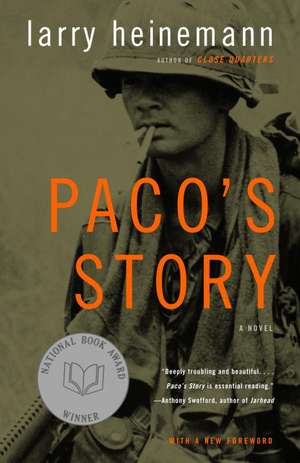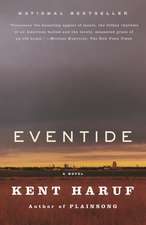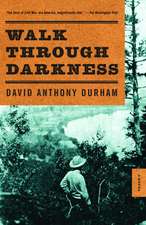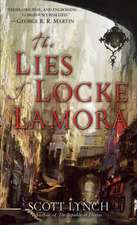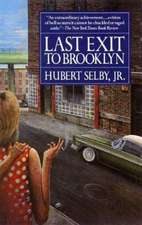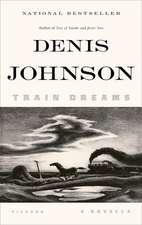Paco's Story
Autor Larry Heinemannen Limba Engleză Paperback – 31 mar 2005
Vezi toate premiile Carte premiată
National Book Awards (1987)
Preț: 106.64 lei
Nou
Puncte Express: 160
Preț estimativ în valută:
20.41€ • 21.23$ • 17.08£
20.41€ • 21.23$ • 17.08£
Carte tipărită la comandă
Livrare economică 15-29 martie
Preluare comenzi: 021 569.72.76
Specificații
ISBN-13: 9781400076833
ISBN-10: 1400076838
Pagini: 208
Dimensiuni: 133 x 205 x 15 mm
Greutate: 0.23 kg
Editura: VINTAGE CONTEMPORARIES
ISBN-10: 1400076838
Pagini: 208
Dimensiuni: 133 x 205 x 15 mm
Greutate: 0.23 kg
Editura: VINTAGE CONTEMPORARIES
Notă biografică
Larry Heinemann was born and raised in Chicago. He served a tour of duty with the 25th Division in Vietnam. In the past he has received fellowships from the National Endowment for the Arts, the Guggenheim Foundation, and the William Fulbright Scholarship Program. He is the author of three novels: Close Quarters, Paco’s Story, and Cooler by the Lake, as well as a memoir, Black Virgin Mountain. His writing has received several honors, including the National Book Award and the Carl Sandburg Award. He currently lives in Chicago with his wife.
Extras
1. The First Clean Fact.
Let's begin with the first clean fact, James: This ain't no war story. War stories are out--one, two, three, and a heave-ho, into the lake you go with all the other alewife scuz and foamy harbor scum. But isn't it a pity All those crinkly soggy sorts of laid-by tellings crowded together as thick and pitiful as street cobbles, floating mushy bellies up, like so much moldy shag rug (dead as rusty-ass doornails and smelling so peculiar and un-Christian). Just isn't it a pity because here and there and yonder among the corpses are some prize-winning, leg-pulling daisies--some real pop-in-the-oven muffins, so to speak, some real softly lobbed, easy-out line drives.
But that's the way of the world, James, or so the fairy tales go. The people with the purse strings and apron strings gripped in their hot and soft little hands denounce war stories--with perfect diction and practiced gestures--as a geek-monster species of evil-ugly rumor. (A geek, James, is a carnival performer whose whole act consists of biting the head off a live chicken or snake.) These people who denounce war stories stand bolt upright and proclaim with broad and timely sweeps of the arm that war stories put other folks to sleep where they sit. (When the contrary is more to the truth, James. Any carny worth his cashbox--not dead or in jail or squirreled away in some county nuthouse--will tell you that most folks will shell out hard-earned, greenback cash, every time, to see artfully performed, urgently fascinating, grisly and gruesome carnage.)
Other people (getting witty and spry, floor-of-the-Senate, let-me-read-this-here-palaver-into-the-Congressional-Record, showboat oratorical) slip one hand under a vest flap and slide one elegantly spit-shined wing-tip shoe forward ever so clever, and swear and be damned if all that snorting at war stories doesn't rattle windows for miles around--all the way to Pokorneyville, or so the papers claim. (Pokorneyville, James, is a real place, you understand, a little bit of a town between Wheeling and Half Day at the junction of U.S. Route 12 and Aptaldsic Road--a Texaco gas station, a Swedish bakery, and Don't Drive Beddie-Bye Motel.)
And a distinct but mouthy minority--book-learned witchcraft amateurs and half-savvy street punks and patriots-for-cash (for some piddling hand-to-mouth wage, James)--slyly hang their heads and secretly insinuate that the snoring (he-honk, he-honk, the way a good, mean, shake-shake-like-a-ragdoll snore snaps at you, James) is nothing if it isn't the Apocalypse itself choking on its own spit, trying to catch its breath for one more go-round.
And the geeks and freaks and sideshow grifters of this world hear the dipstick yokels soaking up a shill like that, well, damned if they don't haul off a belly laugh--haw haw haw. They know a prize-winning shuck when they hear one, James.
They lean back in their folding lawn chairs, lined up in front of their setups and shacks--the Skil-Thro and Ring Toss and Guess-How-Many-Pennies-in-the-Jar-Bub? and such as that---and slap their thighs hard enough to raise welts, all the while whispering among themselves that the rubes of this world will never get the hang of things.
Now, according to some people, folks do not want to hear about Alpha Company--us grunts--busting jungle and busting cherries from Landing Zone Skator-Gator to Scat Man Do (wherever that is), humping and hauling ass all the way. We used French Colonial maps back then--the names of towns and map symbols and elevation lines crinkled and curlicued and squeezed together, as incomprehensible as the Chiricahua dialect of Apache. We never could cipher a goddamned thing on those maps, so absolutely and precisely where Scat Man Do is tongue cannot tell, but we asked around and followed Lieutenant Stennett's nose--flashing through some fine firefight possibilities, punji pits the size of copper mines, not to mention hog pens and chicken coops (scattering chickens and chicken feathers like so many wood chips) We made it to the fountain square in downtown Scat Man Do--and hack to LZ Skator-Gator--in an afternoon, James, singing snatches of arias and duets from Simon Boccanegra and The Flying Dutchman at the top of our socks. But what we went there for no one ever told us, and none of us--what was left of us that time--ever bothered to ask.
And some people think that folks do not want to hear about the night at Fire Base Sweet Pea when the company got kicked in the mouth good and hard--street-fight hard--and wound up spitting slivers of brown teeth and bloody scabs for a fortnight. Lieutenant Stennett had us night-laagered in a lumpy, rocky slope down the way from high ground--his first (but by no stretch of your imagination his last) mistake. And you could hawk a gob of phlegm and spit into the woodline from your foxhole, James, And it was raining to beat the band. And no one was getting any sleep. And just after midnight--according to Gallagher's radium-dial watch--some zonked-out zip crawled up sneaky-close in the mangled underbrush and whispered in the pouring rain, "Hey, you! Rich-chard Nick-zun is a egg-suckin' hunk of runny owlshit!" And then Paco and the rest of us heard him and some other zip giggling--tee-hee-hee-hee--as though that was the world's worst thing they could think to say, and would provoke us into rageful anger. But before any of us could wipe the rain out of our eyes, Jonesy raised his head from his rucksack, where he was taking one of his famous naps--fucking the duck, we called it--and stagewhispered right back, "Listen, you squint-eyed spook, you ain' tellin' me annathang ah don' know!" Then they whispered back at us with one voice, as giggly and shivery cute as a couple smart-ass six-year-olds, "GI, you die tonight!" and then giggled some more. Paco blinked his eyes slowly, glancing out of the corners as if to say he didn't believe he heard what he knew he heard, and shook his head, saying out loud, "What do these zips think this is, some kind of chickenshit Bruce Dern--Michael J. Pollard--John Wayne movie? 'GI, you die tonight!' What kind of a fucked-up attitude is that?" Then he leaned over his soppingwet rucksack in the direction of the smirking giggles, put his hands to his mouth, megaphone-fashion, and said, "Hawkshit," loud enough for the whole company to hear. "Put your money where your mouth is, Slopehead," he said. "Whip it on me!" So later that night they did. They greased half the 4th platoon and Lieutenant Stennett's brand-new radioman, and we greased so many of them it wasn't even funny. The lieutenant got pissed off at Paco for mouthing off and getting his radioman blown away so soon--but that was okay, because the lieutenant wasn't "wrapped too tight," as Jonesy would say.
The next morning we got up, brushed ourselves off, cleared away the air-strike garbage--the firefight junk and jungle junk--and dusted off the walking wounded and the litter wounded and the body bags. And the morning after that, just as right as rain, James, we saddled up our rucksacks and slugged off into the deepest, baddest part of the Goongone Forest north of our base camp at Phuc Luc, looking to kick some ass--anybody's ass (can you dig it, James? )--and take some names. Yessiree! We hacked and humped our way from one end of that goddamned woods to the other--crisscrossing wherever our whim took us--no more sophisticated or complicated or elegant than an organized gang; looking to nail any and all of that goddamned giggling slime we came across to the barn door. Then one bright and cheery morning, when our month was up, Private First Class Elijah Raintree George Washington Carver Jones (Jonesy for short, James) had thirty-nine pairs of blackened, leathery, wrinkly ears strung on a bit of black commo wire and wrapped like a garland around that bit of turned-out brim of his steel helmet. He had snipped the ears off with a pearl-handled straight razor just as quick and slick as you'd lance a boil the size of a baseball--snicker-snack--the way he bragged his uncle could skin a poached deer. He cured the ears a couple days by tucking them under that bit of turned-out brim of his steel helmet, then toted them crammed in a spare sock. The night that Lieutenant Stennett called it quits, Jonesy sat up way after dark stringing those ears on that bit of black wire and sucking snips of C-ration beefsteak through his teeth.
And the next afternoon, when we finally humped through the south gate at Phuc Luc, you should have seen those reararea motherfucking housecats bug their eyes and cringe every muscle in their bodies, and generally suck back against the buildings (you would have been right proud, James). Jonesy danced this way and that--shucking and jiving, juking and high-stepping, rolling his eyes and snapping his fingers in time--twirling that necklace to a fare-thee-well, shaking and jangling it (as much as a necklace of ears will jangle, James) and generally fooling with it as though it were a cheerleader's pom-pom.
And the Phuc Luc base camp Viets couldn't help but look, too. Now, the Viets worked the PX checkout counters (goodlooking women who had to put out right smart and regular to keep their jobs), the PX barbershop (where the Viet barbers could run a thirty-five-cent haircut into $6.50 in fifteen minutes), and the stylishly thatched souvenir shack (where a bandy-legged ARVN cripple sold flimsy beer coolers and zip-a-dee-doo-dah housecat ashtrays, and athletic-style jackets that had a map embroidered on the back with the scrolled legend Hot damn--Vietnam sewn in underneath). And, James, don't you know they were Viets during the day and zips at night; one zip we body-counted one time couldn't booby-trap a shithouse any better than he could cut hair.
Every Viet in base camp crowded the doorways and screened windows, and such as that, gawking at Jonesy--and the rest of us, too. So he made a special show of shaking those ears at them, witch-doctor-fashion, while booming out some gibberish mumbo jumbo in his best amen-corner baritone and laughing that cool, nasty, grisly laugh of his, acting the jive fool for all those housecats. And the rest of the company--what was left of us that time--laughed at him, too, even though we humped those last three hundred meters to the tents (up an incline) on sloppy, bloody blisters, with our teeth gritted and the fraying rucksack straps squeezing permanent grooves in our shoulders. (A body never gets used to humping, James. When the word comes, you saddle your rucksack on your back, take a deep breath and set your jaw good and tight, then lean a little forward, as though you're walking into a stiff and blunt nor'easter, and begin by putting one foot in front of the other. After a good little while you've got two sharp pains as straight as a die from your shoulders to your kidneys, but there's nothing to do for it but grit your teeth a little harder and keep humping. And swear to God, James, those last uphill three hundred meters were the sorriest, goddamnedest three hundred motherfuckers in all of Southeast Asia. Captain Courtney Culpepper, who never missed a chance to flash his West Point class ring in your face--that ring the size of a Hamilton railroad watch--never once sent the trucks to meet us at the gate: said we had humped that far, might as well hump the rest.)
Nor do people think that folks want to hear what a stone bore (and we do mean stone, James) sitting bunker guard could be. Now some troopers called it perimeter guard and some called it berm guard, but it was all the same. The bunkers, James: broad, sloping sandbagged affairs the size of a forty-acre farm on the outside and a one-rack clothes closet inside, lined up every forty meters or so along the perimeter, within easy grenade range of the concertina wire and the marsh. You sit scrunched up, bent-backed, and stoopshouldered on a plain pine plank, staring through a gun slit the size of a mail slot. And you stare at a couple hundred meters of shitty-ass marsh that no zip in his right mind would try to cross, terraced rice paddy long gone to seed, and a raggedy-assed, beat-to-shit woodline yonder. (That woodline was all fucked up, James, because we used to shoot it up every now and again out of sheer fucking boredom.) Well, you stare at all that, and stare at it, until the moonlit, starlit image of weeds and reeds and bamboo saplings and bubbling marsh slime burns itself into the hack of your head in the manner of Daguerre's first go with a camera obscura. You peep through that skinny-ass embrasure with your M--i 6 on full rock and roll, a double armful of fragmentation grenades--frags, we called them--hanging above your head on a double arm's length of tripflare wire, and every hour at the quarter hour you crank up the land-line handphone and call in a situation report--sit-rep, we called it--to the main bunker up the hill in back of you fifty paces or so. "Hell-o? Hell-o, Main Bunker!" you say, extra-friendly-like. "Yez," comes this sleepy, scrawny voice, mellowed by forty meters of land-line commo wire. "This here is Bunker Number 7," you say, and snatch one more glance downrange--everything bone-numb evil and cathedralquiet. "Everything is okeydokey. Hunky-dory. In-the-pink and couldn't-be-sweeter!" And that sleepy, scrawny voice takes a good long pause, and takes a breath, and drawls right back at you, Well, okay, cuz!"
And between those calls up the hill--and taking a break every now and again to take a whiz, downrange--you have nothing better to do than stare at that marsh and twiddle your thumbs, and give the old pecker a few tugs for the practice, wet-dreaming about that Eurasian broad with the luscious, exquisite titties who toured with a Filipino trio and turned tricks for anyone of commissioned rank.
Those Filipinos, James, they were extra-ordinary One guy played a rickety Hawaiian guitar, one guy played a banged-up tenor saxophone, and the third guy played the electric accordion--and that dude could squeeze some fine accordion, James. That trio and the woman played every nickel-and-dime base camp, every falling-down mess hall and sleazy, scruffy Enlisted Men's Club south of the 17th Parallel (the DMZ, we called it)--as famous in their own way as Washing Machine Charlie, the legendary night rider of Guadalcanal. So how come they never made the papers, you may ask.
Well, James, reporters, as a gang, acted as though our whole purpose for being there was to entertain them. They'd look at you from under the snappily canted brim of an Abercrombie & Fitch Australian bush hat as much as to say, "Come on, kid, astonish me! Say something fucked up and quotable, something evil, something bloody and nasty, and be quick about it--I ain't got all day, I'm on a deadline." But mostly you'd see them with one foot on the lead-pipe rail and one elbow on the stained plywood bar of the Mark Twain Lounge of the HyattRegency Saigon, swilling ice-cold raspberry daiquiris and vodka sours by the pitcherful--pussy drinks, bartenders call them. The younger, "hipper" ones popped opium on the sly or sprinkled it on their jays, and chewed speed like Aspergum, but their rap was the same, "Don't these ignorant fucking grunts die ugly! It's goddamned bee-utiful!" They'd lean sideways against the bar, drugstore-cowboy-style--twiddling their swizzle sticks--and stare down at their rugged-looking L. L. Bean hiking boots or Adidas triple-strip deluxe gym shoes, swapping bullshit lies and up-country war stories. "Say, Jack," would say this dried-up, milky-eyed old sports hack from the Pokorneyville Weekly Volunteer-Register, "I seen this goofy, wiggy-eyed, light-skinned spade up at Fire Base Gee-Gaw las' week. Had some weird shit scrawled on the back of his flak jacket, Jack: 'Rule 1. Take no shit. Rule 2. Cut no slack. Rule 3. Kill all prisoners.' I ast him if he was octoroon--he looked octoroon to me--and he says (can you beat this?), 'I ain't octoroon, I'm from Philly!' Haw-shit, buddy-boy, some of these nigras is awful D-U-M-B." Then slush-eyes'll take another couple he-man slugs of raspberry daiquiri, smacking his lips and grinning to high heaven.
Let's begin with the first clean fact, James: This ain't no war story. War stories are out--one, two, three, and a heave-ho, into the lake you go with all the other alewife scuz and foamy harbor scum. But isn't it a pity All those crinkly soggy sorts of laid-by tellings crowded together as thick and pitiful as street cobbles, floating mushy bellies up, like so much moldy shag rug (dead as rusty-ass doornails and smelling so peculiar and un-Christian). Just isn't it a pity because here and there and yonder among the corpses are some prize-winning, leg-pulling daisies--some real pop-in-the-oven muffins, so to speak, some real softly lobbed, easy-out line drives.
But that's the way of the world, James, or so the fairy tales go. The people with the purse strings and apron strings gripped in their hot and soft little hands denounce war stories--with perfect diction and practiced gestures--as a geek-monster species of evil-ugly rumor. (A geek, James, is a carnival performer whose whole act consists of biting the head off a live chicken or snake.) These people who denounce war stories stand bolt upright and proclaim with broad and timely sweeps of the arm that war stories put other folks to sleep where they sit. (When the contrary is more to the truth, James. Any carny worth his cashbox--not dead or in jail or squirreled away in some county nuthouse--will tell you that most folks will shell out hard-earned, greenback cash, every time, to see artfully performed, urgently fascinating, grisly and gruesome carnage.)
Other people (getting witty and spry, floor-of-the-Senate, let-me-read-this-here-palaver-into-the-Congressional-Record, showboat oratorical) slip one hand under a vest flap and slide one elegantly spit-shined wing-tip shoe forward ever so clever, and swear and be damned if all that snorting at war stories doesn't rattle windows for miles around--all the way to Pokorneyville, or so the papers claim. (Pokorneyville, James, is a real place, you understand, a little bit of a town between Wheeling and Half Day at the junction of U.S. Route 12 and Aptaldsic Road--a Texaco gas station, a Swedish bakery, and Don't Drive Beddie-Bye Motel.)
And a distinct but mouthy minority--book-learned witchcraft amateurs and half-savvy street punks and patriots-for-cash (for some piddling hand-to-mouth wage, James)--slyly hang their heads and secretly insinuate that the snoring (he-honk, he-honk, the way a good, mean, shake-shake-like-a-ragdoll snore snaps at you, James) is nothing if it isn't the Apocalypse itself choking on its own spit, trying to catch its breath for one more go-round.
And the geeks and freaks and sideshow grifters of this world hear the dipstick yokels soaking up a shill like that, well, damned if they don't haul off a belly laugh--haw haw haw. They know a prize-winning shuck when they hear one, James.
They lean back in their folding lawn chairs, lined up in front of their setups and shacks--the Skil-Thro and Ring Toss and Guess-How-Many-Pennies-in-the-Jar-Bub? and such as that---and slap their thighs hard enough to raise welts, all the while whispering among themselves that the rubes of this world will never get the hang of things.
Now, according to some people, folks do not want to hear about Alpha Company--us grunts--busting jungle and busting cherries from Landing Zone Skator-Gator to Scat Man Do (wherever that is), humping and hauling ass all the way. We used French Colonial maps back then--the names of towns and map symbols and elevation lines crinkled and curlicued and squeezed together, as incomprehensible as the Chiricahua dialect of Apache. We never could cipher a goddamned thing on those maps, so absolutely and precisely where Scat Man Do is tongue cannot tell, but we asked around and followed Lieutenant Stennett's nose--flashing through some fine firefight possibilities, punji pits the size of copper mines, not to mention hog pens and chicken coops (scattering chickens and chicken feathers like so many wood chips) We made it to the fountain square in downtown Scat Man Do--and hack to LZ Skator-Gator--in an afternoon, James, singing snatches of arias and duets from Simon Boccanegra and The Flying Dutchman at the top of our socks. But what we went there for no one ever told us, and none of us--what was left of us that time--ever bothered to ask.
And some people think that folks do not want to hear about the night at Fire Base Sweet Pea when the company got kicked in the mouth good and hard--street-fight hard--and wound up spitting slivers of brown teeth and bloody scabs for a fortnight. Lieutenant Stennett had us night-laagered in a lumpy, rocky slope down the way from high ground--his first (but by no stretch of your imagination his last) mistake. And you could hawk a gob of phlegm and spit into the woodline from your foxhole, James, And it was raining to beat the band. And no one was getting any sleep. And just after midnight--according to Gallagher's radium-dial watch--some zonked-out zip crawled up sneaky-close in the mangled underbrush and whispered in the pouring rain, "Hey, you! Rich-chard Nick-zun is a egg-suckin' hunk of runny owlshit!" And then Paco and the rest of us heard him and some other zip giggling--tee-hee-hee-hee--as though that was the world's worst thing they could think to say, and would provoke us into rageful anger. But before any of us could wipe the rain out of our eyes, Jonesy raised his head from his rucksack, where he was taking one of his famous naps--fucking the duck, we called it--and stagewhispered right back, "Listen, you squint-eyed spook, you ain' tellin' me annathang ah don' know!" Then they whispered back at us with one voice, as giggly and shivery cute as a couple smart-ass six-year-olds, "GI, you die tonight!" and then giggled some more. Paco blinked his eyes slowly, glancing out of the corners as if to say he didn't believe he heard what he knew he heard, and shook his head, saying out loud, "What do these zips think this is, some kind of chickenshit Bruce Dern--Michael J. Pollard--John Wayne movie? 'GI, you die tonight!' What kind of a fucked-up attitude is that?" Then he leaned over his soppingwet rucksack in the direction of the smirking giggles, put his hands to his mouth, megaphone-fashion, and said, "Hawkshit," loud enough for the whole company to hear. "Put your money where your mouth is, Slopehead," he said. "Whip it on me!" So later that night they did. They greased half the 4th platoon and Lieutenant Stennett's brand-new radioman, and we greased so many of them it wasn't even funny. The lieutenant got pissed off at Paco for mouthing off and getting his radioman blown away so soon--but that was okay, because the lieutenant wasn't "wrapped too tight," as Jonesy would say.
The next morning we got up, brushed ourselves off, cleared away the air-strike garbage--the firefight junk and jungle junk--and dusted off the walking wounded and the litter wounded and the body bags. And the morning after that, just as right as rain, James, we saddled up our rucksacks and slugged off into the deepest, baddest part of the Goongone Forest north of our base camp at Phuc Luc, looking to kick some ass--anybody's ass (can you dig it, James? )--and take some names. Yessiree! We hacked and humped our way from one end of that goddamned woods to the other--crisscrossing wherever our whim took us--no more sophisticated or complicated or elegant than an organized gang; looking to nail any and all of that goddamned giggling slime we came across to the barn door. Then one bright and cheery morning, when our month was up, Private First Class Elijah Raintree George Washington Carver Jones (Jonesy for short, James) had thirty-nine pairs of blackened, leathery, wrinkly ears strung on a bit of black commo wire and wrapped like a garland around that bit of turned-out brim of his steel helmet. He had snipped the ears off with a pearl-handled straight razor just as quick and slick as you'd lance a boil the size of a baseball--snicker-snack--the way he bragged his uncle could skin a poached deer. He cured the ears a couple days by tucking them under that bit of turned-out brim of his steel helmet, then toted them crammed in a spare sock. The night that Lieutenant Stennett called it quits, Jonesy sat up way after dark stringing those ears on that bit of black wire and sucking snips of C-ration beefsteak through his teeth.
And the next afternoon, when we finally humped through the south gate at Phuc Luc, you should have seen those reararea motherfucking housecats bug their eyes and cringe every muscle in their bodies, and generally suck back against the buildings (you would have been right proud, James). Jonesy danced this way and that--shucking and jiving, juking and high-stepping, rolling his eyes and snapping his fingers in time--twirling that necklace to a fare-thee-well, shaking and jangling it (as much as a necklace of ears will jangle, James) and generally fooling with it as though it were a cheerleader's pom-pom.
And the Phuc Luc base camp Viets couldn't help but look, too. Now, the Viets worked the PX checkout counters (goodlooking women who had to put out right smart and regular to keep their jobs), the PX barbershop (where the Viet barbers could run a thirty-five-cent haircut into $6.50 in fifteen minutes), and the stylishly thatched souvenir shack (where a bandy-legged ARVN cripple sold flimsy beer coolers and zip-a-dee-doo-dah housecat ashtrays, and athletic-style jackets that had a map embroidered on the back with the scrolled legend Hot damn--Vietnam sewn in underneath). And, James, don't you know they were Viets during the day and zips at night; one zip we body-counted one time couldn't booby-trap a shithouse any better than he could cut hair.
Every Viet in base camp crowded the doorways and screened windows, and such as that, gawking at Jonesy--and the rest of us, too. So he made a special show of shaking those ears at them, witch-doctor-fashion, while booming out some gibberish mumbo jumbo in his best amen-corner baritone and laughing that cool, nasty, grisly laugh of his, acting the jive fool for all those housecats. And the rest of the company--what was left of us that time--laughed at him, too, even though we humped those last three hundred meters to the tents (up an incline) on sloppy, bloody blisters, with our teeth gritted and the fraying rucksack straps squeezing permanent grooves in our shoulders. (A body never gets used to humping, James. When the word comes, you saddle your rucksack on your back, take a deep breath and set your jaw good and tight, then lean a little forward, as though you're walking into a stiff and blunt nor'easter, and begin by putting one foot in front of the other. After a good little while you've got two sharp pains as straight as a die from your shoulders to your kidneys, but there's nothing to do for it but grit your teeth a little harder and keep humping. And swear to God, James, those last uphill three hundred meters were the sorriest, goddamnedest three hundred motherfuckers in all of Southeast Asia. Captain Courtney Culpepper, who never missed a chance to flash his West Point class ring in your face--that ring the size of a Hamilton railroad watch--never once sent the trucks to meet us at the gate: said we had humped that far, might as well hump the rest.)
Nor do people think that folks want to hear what a stone bore (and we do mean stone, James) sitting bunker guard could be. Now some troopers called it perimeter guard and some called it berm guard, but it was all the same. The bunkers, James: broad, sloping sandbagged affairs the size of a forty-acre farm on the outside and a one-rack clothes closet inside, lined up every forty meters or so along the perimeter, within easy grenade range of the concertina wire and the marsh. You sit scrunched up, bent-backed, and stoopshouldered on a plain pine plank, staring through a gun slit the size of a mail slot. And you stare at a couple hundred meters of shitty-ass marsh that no zip in his right mind would try to cross, terraced rice paddy long gone to seed, and a raggedy-assed, beat-to-shit woodline yonder. (That woodline was all fucked up, James, because we used to shoot it up every now and again out of sheer fucking boredom.) Well, you stare at all that, and stare at it, until the moonlit, starlit image of weeds and reeds and bamboo saplings and bubbling marsh slime burns itself into the hack of your head in the manner of Daguerre's first go with a camera obscura. You peep through that skinny-ass embrasure with your M--i 6 on full rock and roll, a double armful of fragmentation grenades--frags, we called them--hanging above your head on a double arm's length of tripflare wire, and every hour at the quarter hour you crank up the land-line handphone and call in a situation report--sit-rep, we called it--to the main bunker up the hill in back of you fifty paces or so. "Hell-o? Hell-o, Main Bunker!" you say, extra-friendly-like. "Yez," comes this sleepy, scrawny voice, mellowed by forty meters of land-line commo wire. "This here is Bunker Number 7," you say, and snatch one more glance downrange--everything bone-numb evil and cathedralquiet. "Everything is okeydokey. Hunky-dory. In-the-pink and couldn't-be-sweeter!" And that sleepy, scrawny voice takes a good long pause, and takes a breath, and drawls right back at you, Well, okay, cuz!"
And between those calls up the hill--and taking a break every now and again to take a whiz, downrange--you have nothing better to do than stare at that marsh and twiddle your thumbs, and give the old pecker a few tugs for the practice, wet-dreaming about that Eurasian broad with the luscious, exquisite titties who toured with a Filipino trio and turned tricks for anyone of commissioned rank.
Those Filipinos, James, they were extra-ordinary One guy played a rickety Hawaiian guitar, one guy played a banged-up tenor saxophone, and the third guy played the electric accordion--and that dude could squeeze some fine accordion, James. That trio and the woman played every nickel-and-dime base camp, every falling-down mess hall and sleazy, scruffy Enlisted Men's Club south of the 17th Parallel (the DMZ, we called it)--as famous in their own way as Washing Machine Charlie, the legendary night rider of Guadalcanal. So how come they never made the papers, you may ask.
Well, James, reporters, as a gang, acted as though our whole purpose for being there was to entertain them. They'd look at you from under the snappily canted brim of an Abercrombie & Fitch Australian bush hat as much as to say, "Come on, kid, astonish me! Say something fucked up and quotable, something evil, something bloody and nasty, and be quick about it--I ain't got all day, I'm on a deadline." But mostly you'd see them with one foot on the lead-pipe rail and one elbow on the stained plywood bar of the Mark Twain Lounge of the HyattRegency Saigon, swilling ice-cold raspberry daiquiris and vodka sours by the pitcherful--pussy drinks, bartenders call them. The younger, "hipper" ones popped opium on the sly or sprinkled it on their jays, and chewed speed like Aspergum, but their rap was the same, "Don't these ignorant fucking grunts die ugly! It's goddamned bee-utiful!" They'd lean sideways against the bar, drugstore-cowboy-style--twiddling their swizzle sticks--and stare down at their rugged-looking L. L. Bean hiking boots or Adidas triple-strip deluxe gym shoes, swapping bullshit lies and up-country war stories. "Say, Jack," would say this dried-up, milky-eyed old sports hack from the Pokorneyville Weekly Volunteer-Register, "I seen this goofy, wiggy-eyed, light-skinned spade up at Fire Base Gee-Gaw las' week. Had some weird shit scrawled on the back of his flak jacket, Jack: 'Rule 1. Take no shit. Rule 2. Cut no slack. Rule 3. Kill all prisoners.' I ast him if he was octoroon--he looked octoroon to me--and he says (can you beat this?), 'I ain't octoroon, I'm from Philly!' Haw-shit, buddy-boy, some of these nigras is awful D-U-M-B." Then slush-eyes'll take another couple he-man slugs of raspberry daiquiri, smacking his lips and grinning to high heaven.
Recenzii
“Resonates with a devastating and bitter irony. . . . Heinemann writes about the workingman’s Vietnam, exceptional for its bleak, shared, unexceptional reality. This is the war, no question, and there is no escape.” —The Philadelphia Inquirer
“Larry Heinemann is . . . the grunt’s novelist of the Vietnam War. His is the storytelling of a life and death between the laager and the treeline, a life of dirt, fear, dope, alcohol, brutality, curses, and evil.” --The Washington Post Book World
“Paco’s Story deserves a place among the best Vietnam war novels.” —Providence Sunday Journal
“Larry Heinemann tells this story as if talking aloud, at times a hip, cynical patter that contains the bitterness Paco never speaks. . . . A fiction that rings truer than factual accounts.” --The Boston Globe
“Even if Platoon were a great movie instead of just a good one, I don't think it would approach the lingering emotional effects of Paco's Story. I shook Platoon after one day; I still haven't shaken the novel.” -Chicago Sun-Times
“Do not read Paco's Story unless you are prepared to find yourself bitterly wanting to cry. The tears, if they come, will be for the ghosts of Vietnam. Paco's Story is brave and terrible.” —The Atlanta Journal-Constitution
“This is strong, heart-wrenching stuff by one of America's most important living authors.” -Robert Mason, author of Chickenhawk
“Paco's Story, brief and with a remarkable intensity, presses the social claims of those who died literally, and those who survived but whose history, for all the place it has today, might as well be dead.” -Los Angeles Times
“A novel of such terrible power, it puts Heinemann in the company of the finest American writers...You have never read anything like Paco's Story.” -Gloria Emerson
“Paco's Story is eerie, powerful, and convincing.” -Tracy Kidder
“Powerfully evocative....The language is visceral and compelling, the scenes vivid and highly detailed, while the rolling narrative resembles an emotional minefield.” —The Boston Herald
“A harsh, bitter novel that tears its way into the mind and refuses to leave.” -The Chattanooga Times
“A tale for the workingman, filled with bitter ironies, gritty dialogue and an introspective sense of what is happening to one man in one private hell.” —Richmond-Times Dispatch
“Larry Heinemann is . . . the grunt’s novelist of the Vietnam War. His is the storytelling of a life and death between the laager and the treeline, a life of dirt, fear, dope, alcohol, brutality, curses, and evil.” --The Washington Post Book World
“Paco’s Story deserves a place among the best Vietnam war novels.” —Providence Sunday Journal
“Larry Heinemann tells this story as if talking aloud, at times a hip, cynical patter that contains the bitterness Paco never speaks. . . . A fiction that rings truer than factual accounts.” --The Boston Globe
“Even if Platoon were a great movie instead of just a good one, I don't think it would approach the lingering emotional effects of Paco's Story. I shook Platoon after one day; I still haven't shaken the novel.” -Chicago Sun-Times
“Do not read Paco's Story unless you are prepared to find yourself bitterly wanting to cry. The tears, if they come, will be for the ghosts of Vietnam. Paco's Story is brave and terrible.” —The Atlanta Journal-Constitution
“This is strong, heart-wrenching stuff by one of America's most important living authors.” -Robert Mason, author of Chickenhawk
“Paco's Story, brief and with a remarkable intensity, presses the social claims of those who died literally, and those who survived but whose history, for all the place it has today, might as well be dead.” -Los Angeles Times
“A novel of such terrible power, it puts Heinemann in the company of the finest American writers...You have never read anything like Paco's Story.” -Gloria Emerson
“Paco's Story is eerie, powerful, and convincing.” -Tracy Kidder
“Powerfully evocative....The language is visceral and compelling, the scenes vivid and highly detailed, while the rolling narrative resembles an emotional minefield.” —The Boston Herald
“A harsh, bitter novel that tears its way into the mind and refuses to leave.” -The Chattanooga Times
“A tale for the workingman, filled with bitter ironies, gritty dialogue and an introspective sense of what is happening to one man in one private hell.” —Richmond-Times Dispatch
Premii
- National Book Awards Winner, 1987
